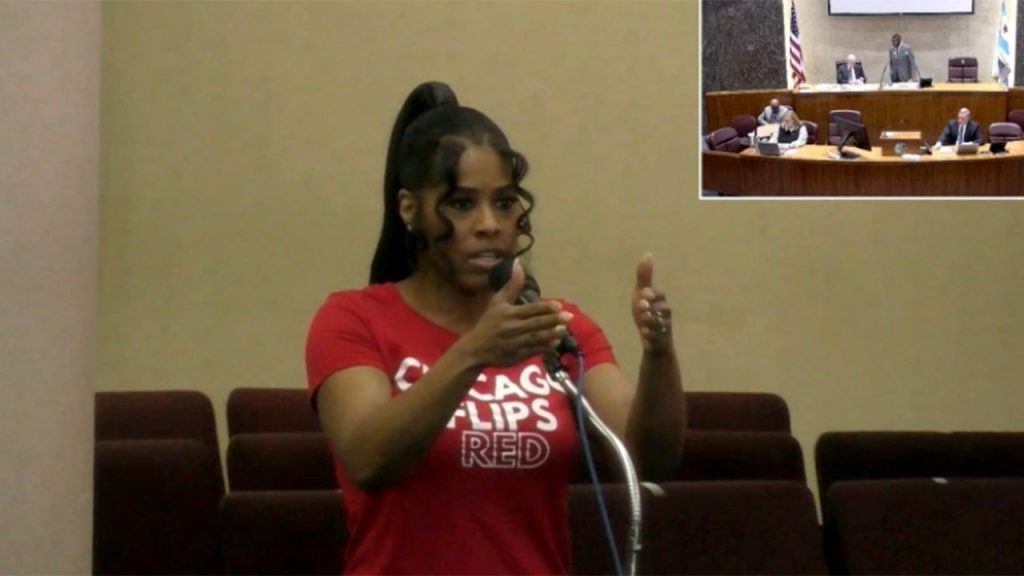Residents of Chicago are expressing intense frustration with Mayor Brandon Johnson regarding the city’s financial commitment to sheltering migrants, which has exceeded $574.5 million since the program’s launch in August 2022. At a recent City Council meeting, one resident confronted Johnson directly, condemning him as “the worst mayor in America.” This criticism is particularly poignant as Johnson attempts to navigate a looming $1 billion budget deficit. The City Council is considering a proposed property tax increase of about $60 million as a potential means to close the financial gap, prompting further outrage from constituents who feel the burden of these decisions is being unfairly placed on residents rather than seeking alternate solutions.
During the meeting, several residents voiced their discontent not only with the financial implications of the New Arrivals Mission but also with how their concerns were being met by the Mayor’s office. One woman suggested that cutting funding to undocumented immigrants who receive assistance such as housing and schooling could help alleviate the city’s budget issues. She also called for cuts to Johnson’s own salary, emphasizing her belief that he is failing to serve the city’s residents effectively during a time of fiscal strain. This sentiment of frustration was echoed by others who feel that their tax dollars are being mismanaged and that city resources are primarily benefitting migrants instead of addressing the pressing needs of long-standing residents.
Another poignant voice was that of an immigrant who legally entered the U.S. The resident articulated her embarrassment regarding the situation, indicating that she feels the presence of undocumented individuals undermines the contributions of legal residents and U.S. citizens alike. She strongly criticized the perception that some migrants expect entitlement to resources and services that should instead be reserved for American citizens, particularly those grappling with poverty and economic hardship. Her remarks highlight underlying tensions about immigration policy, social responsibility, and the potential feelings of resentment among those who may feel overlooked by their government during a crisis.
At one crucial moment in the City Council meeting, a resident challenged Johnson’s lack of direct engagement during his address, insisting that his failure to maintain eye contact reflected poor leadership. The community’s strong responses portray a growing sentiment that Johnson is not adequately representing or listening to the needs of his constituents. They expressed a desire for transparency and accountability from their elected officials, particularly at a time when budgetary constraints are causing public services to be stretched thin. This disconnect between the electorate and their leadership raises questions about current governance practices and the effectiveness of decision-making in Chicago.
In response to the criticisms, Johnson has defended the New Arrivals Mission, asserting its goal is to offer emergency shelter amid a humanitarian crisis while also planning for future challenges related to migration and displacement. Supporting this initiative included partnerships with state and county governments to facilitate essential services for the influx of nearly 39,000 asylum seekers—positioning Chicago as a major city receiving migrants, following New York City and Denver. Johnson’s office has emphasized the mission’s intentions of providing not just emergency assistance, but also a pathway to self-sufficiency for new arrivals, underlining the city’s commitment to managing the complexities of urban resettlement.
As the year draws to a close, the New Arrivals Mission is expected to be phased out in response to both decreasing migration rates and current financial realities. Johnson announced a shift towards a more strategic approach to addressing homelessness that encompasses all citizens needing support in Chicago. However, the overwhelming backlash from residents exemplifies a wider concern about resource allocation and governance during a time of crisis. The city’s handling of the migrant situation remains a contentious subject, exemplifying a significant challenge for the mayor and his administration as they attempt to reconcile fiscal responsibility with humanitarian assistance in a diverse urban environment.


